The Eastern Adventures of Theodotus of Calydon
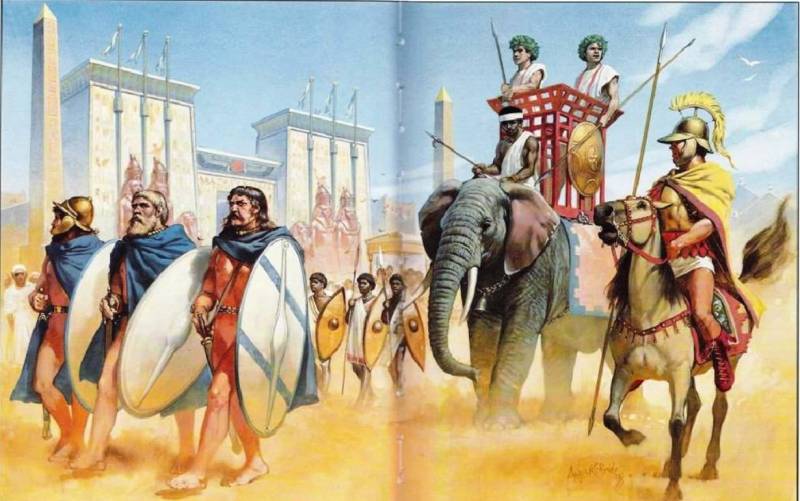
The Aetolian adventurer Theodotus from the city of Calydon can by no means be called an outstanding personality whose deeds determined the course of stories. He did not lead numerous armies, did not make fateful political decisions, did not try his luck in search of distant and uncharted lands. However, thanks to the whirlpool of events that unfolded in the Middle East during the IV Syrian War, he made a name for himself and turned from an ordinary mercenary into a prominent military leader of that turbulent period.
The main source shedding light on the life and work of Theodotus was and remains the ancient Greek historian Polybius, who repeatedly mentioned the commander on the pages of the General History. But, remembering the hostility that Polybius had for the Aetolians, and even more so for the Aetolian mercenaries, one should perceive the description of events under his authorship with the participation of our hero with a certain amount of skepticism.
In general, the available information is clearly not enough to completely avoid chronological and factual gaps. For this reason, some dark episodes from the life of Theodotus can be spoken of based only on an analysis of the events that took place around him.
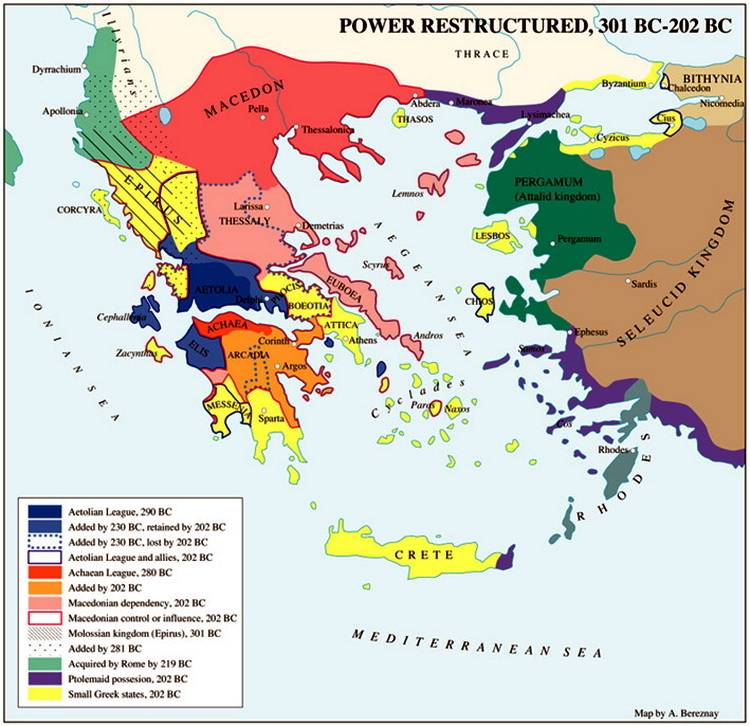
Changing spheres of influence in the Hellenistic world in 301–202 BC e.
Start of the journey: Demetrius' war
In the texts of Polybius up to 221 BC. e. there is no evidence of where Theodotus lived or what he did. Historians agree that before arriving in Egypt, the Calydonian took part in the Demetrius War of 239-227. BC e., fighting under the banner of the Aetolian Union, which joined forces with the Achaeans in the fight against Macedonia. The Ptolemies also did not stand aside and supported both Greek symmachias.
Taking advantage of the fact that the Macedonians were bogged down in the war with the Dardanians, the allies attempted to invade Thessaly. The Macedonian king Demetrius II immediately sent part of the troops against the Greeks under the leadership of the strategist Bitii. Tom managed to defeat the Allies at the Battle of Philakia, forcing them to leave Thessaly and abandon active offensive operations.
Capturing Boeotia, Phocis, Locris, which until that moment were part of the zone of influence of the Aetolian Union, and also defeated with the support of the Illyrian king Agron in 231 BC. e. Aetolian troops besieging the city of Medion in Acarnania, Demetrius again turned his attention to the Dardanians. According to I. G. Droyzen, the Macedonian king died in the war with them around 229 BC. e. It fell to his brother, Antigonus III Doson, to end the war.
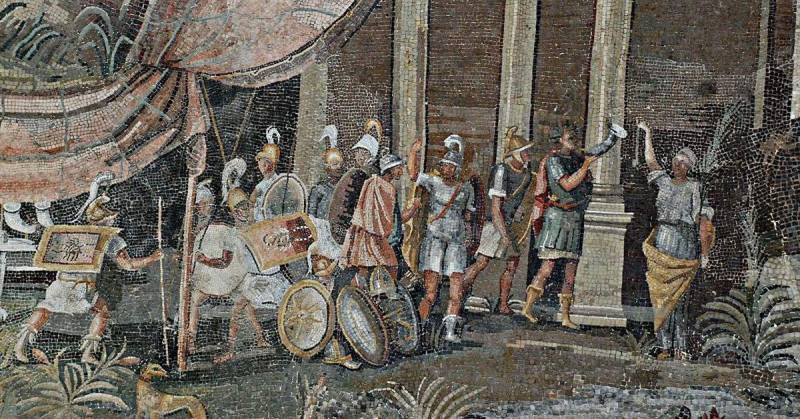
Warriors of the Ptolemaic army depicted on the Nile mosaic. Palestrina, Italy. The date of the creation of the mosaic continues to be debated. Presumably, it refers to the end of the II - the beginning of the I century BC. e.
By that time, the Aetolians had already managed to lick their wounds and recover from a series of military failures. Boeotia was recaptured and some areas of Thessaly were captured, while the Achaeans continued to build up their forces and strengthen their positions in the Peloponnese.
The new Macedonian monarch started very vigorously, not allowing the newly recovered enemies to develop success. Having defeated the Aetolians and regaining control of Thessaly, during the negotiations he convinced the leaders of the Aetolian Union to stop cooperation with the Achaeans, after which he focused on capturing the Asia Minor possessions of the Ptolemies and preparing a decisive blow against the Achaean Union. However, the Aetolians - as, probably, our hero - did not take part in these events.
In the service of the Ptolemies
About the reasons that forced Theodotos to leave his homeland and go about 228-227. BC e. to the East, nothing is known. It could be his expulsion as a participant in the war on the side of the anti-Macedonian coalition at the request of the Macedonians, and a banal search for a wealthy employer - after the signing of an agreement between the Aetolian Union and Ptolemy III Euergetes, a whole stream of Aetolian mercenaries poured into Egypt in search of profit. Sunk into oblivion and any information about the status and rank of the Greek commander at the time of the beginning of the service.
His career in a new place was clearly set for him: by 221 BC. e. the Aetolian held a position that, following Polybius, historians interpret as the “ruler of Coele-Syria” - perhaps in this case we are talking about the post of commander of the local military contingent. This area, nicknamed "the gates of Egypt", has been a bone of contention and the cause of most of the wars between the Ptolemies and the Seleucids since the time of the Founding Fathers. The fact that the defense of such a strategically important region was entrusted to Theodotus may serve as additional evidence of his military talents.
In the winter of 222–221 BC e. important changes took place in the life of both opposing states: Ptolemy IV, later known as Philopator, after the death of his father, took the throne in Alexandria, and fifteen-year-old Antiochus III became the head of the Seleucid state. State decisions taken by the two rulers during this period were dictated by the strong influence of the closest advisers: Sosibius, who actually ruled on behalf of Ptolemy, and Hermias, the “manager of affairs” of the Syrian king during his formative years.
Young Antiochus was full of energy and eager to recapture Coele-Syria, lost by his predecessor as a result of the unsuccessful Syrian War III. Despite the rebellion of the brothers Molon and Alexander, the satraps of Media and Persia, the young king trusted the advice of Hermias and sent a commander named Xenoit to suppress the uprising, and he himself began preparations for a campaign against Alexandria.
The invasion began in the summer of 221 BC. e.
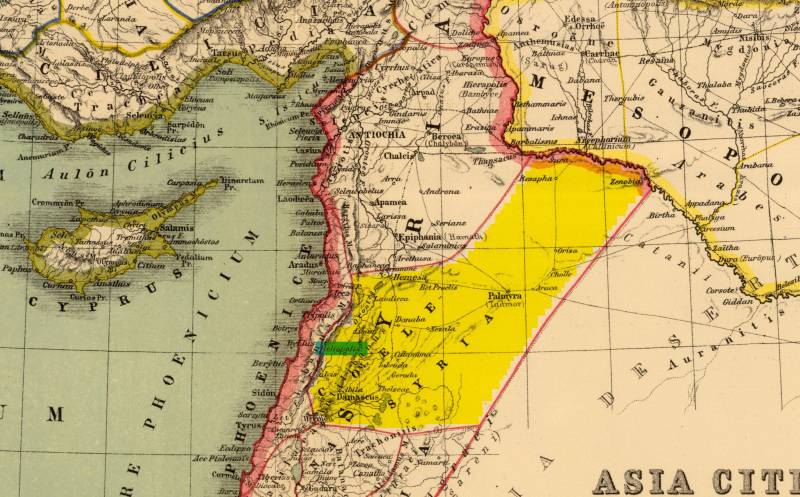
Celesyria highlighted in yellow on Heinrich Kiepert's map. It connected the rulers of Alexandria with their overseas possessions, served as a corridor to Mesopotamia, Asia Minor and Arabia.
Theodotus, who was responsible for the protection of the territory entrusted to him, managed to competently establish defense. Expecting an offensive through the Bekaa Valley (the territory of modern Lebanon), he replenished the garrisons of the fortresses Gerra and Brohi stationed here with soldiers, and he himself, with the main forces, settled in a hard-to-reach gorge, strengthening his positions with additional fortifications.
Antiochus carried out several attacks on the position of the Egyptians, however, despite the numerical superiority, he failed to capture them and suffered heavy losses.
Meanwhile, food was running out in the Seleucid army, and there was nowhere to replenish supplies. Just at this moment, the Syrian king was notified of the defeat of Xenoit and Molon's invasion of Seleucia. The campaign was interrupted, and Antiochus himself went to suppress the rebellion of the brothers.
In the spring of 220 BC. e. Molon was defeated and committed suicide. Upon learning of this, Alexander, who was at that moment in Persia, laid hands on himself.
The purges of Sosibius and the letter to Antiochus
Meanwhile, passions were seething at the court of the new pharaoh.
The beginning of the reign of Ptolemy IV began with reprisals against the closest relatives: he killed his uncle and mother, as well as his own brother Magas, the main contender for the throne. The main initiator of the murders was Ptolemy's adviser Sosibius, who saw in the victims a threat to his own almost unlimited power. The cunning Alexandrian, described by Polybius as "a cunning and experienced old scoundrel", managed to achieve a lot during the life of Ptolemy III Euergetes, having risen to the rank of high priest. Taking advantage of the lack of will of the king, who spent all his time in entertainment and did not want to engage in state affairs, Sosibius began to eliminate all the courtiers who were disloyal to him.
Most of all, the treacherous courtier was afraid of representatives of the military aristocracy, who had unshakable authority and respect among ordinary soldiers. The most striking of them was the Spartan king Cleomenes III, an outstanding politician and commander, who was forced to leave Hellas after being defeated in an uncompromising war with the Achaean League and Macedonia. Ptolemy Euergetes granted asylum to Cleomenes and his associates, promising to allocate resources to invade Hellas and start a new war. However, things did not progress further than words, and with the death of Ptolemy III, the hopes of the Spartan commander completely turned to dust.
Philopator was not interested in the aspirations of the Spartan king, but Sosibius, not without reason, feared Cleomenes and his influence on the mercenaries stationed in Alexandria. In 219 BC. e. the Spartan king and his associates were arrested. Having managed to escape from imprisonment, they attempted a coup, but failed. After the failure of the rebellion, Cleomenes and his comrades committed suicide. Unable to get to the leaders of the rebels, the soldiers of Philopator committed a cruel massacre against their relatives.
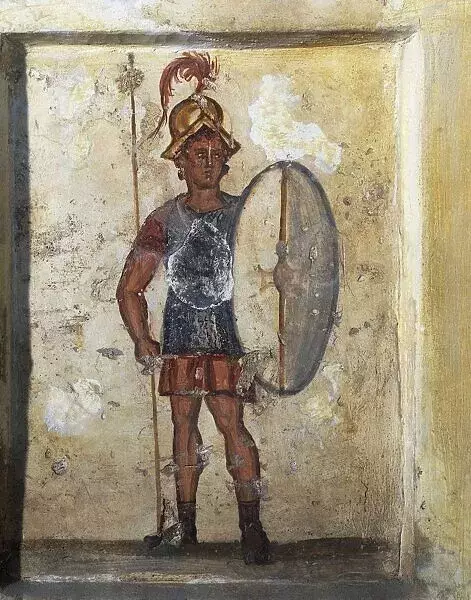
Stele from Sidon depicting the Pisidian Salmas in the service of the Ptolemies, XNUMXnd century BC. e. Archaeological Museum, Istanbul
Theodotus was one of the lucky ones who did not fall under the wheel of repression.
Opinions differ as to how he did this. The German historian of antiquities, Werner Huss, suggested that Ptolemy initially favored Theodotus, and the latter, in turn, helped the king gain a foothold on the throne and personally eliminated his brother Magas.
This idea can hardly be considered sufficiently substantiated for two reasons: firstly, there is no evidence indicating that Theodotus belongs to the number of the so-called "friends of the king", and secondly, the prince's killer was called Theog or Theogen, and with our hero he can only be related by origin.
It is possible that during the period of the purges, Theodotus was generally in Coele-Syria, where he was sent back under Euergetes. It is difficult to judge how the Aetolian himself treated what was happening in the capital and what kind of relationship he had with the king and his first minister. Be that as it may, in the end he still ended up on the lists of objectionable.
In the same year 219 BC. e. Nicholas, one of the commanders of Ptolemy IV, arrived in Celesyria, who, most likely, was to take the place of Theodotus, and the Aetolian himself was arrested and sent to the capital for execution. The Calydonian refused to resign and was besieged by a "changer" in Ptolemais (the modern city of Acre in Israel). Realizing the hopelessness of his situation, Theodotus decided to start a dialogue with Antiochus and sent him a letter, offering the Syrian king support and the transfer of all cities controlled by the Aetolian in exchange for military assistance against the former "employers".
The specific terms of the peace agreement are not announced by Polybius, one can only be content with information about the negotiations that took place earlier. Presumably, Antiochus returned to Ptolemy all the cities captured during the campaign. The only exception here could be Seleucia Pieria, which the Egyptian ruler deliberately refused, since holding the city, located in the center of enemy possessions, was not advisable.
Asiatic scourge of Antioch
Meanwhile, the monarch of the Seleucid state, with his characteristic energy, was preparing for a new war with Ptolemy. As with the first unsuccessful invasion of Egypt, circumstances arose that prevented the concentration of all available forces in one direction.
After the suppression of the rebellion of Molon and Alexander, Antiochus had a new headache - this time in Asia Minor in the person of Achaea, a representative of the royal family and a local satrap. He was a relative of Seleucus III Ceraunus, the elder brother of Antiochus III, who was treacherously murdered by his own officers. After ascension to the throne, Antiochus sent his uncle to manage the Asia Minor possessions, where he during the years 223-220. BC e. not unsuccessfully conducted military operations against the Kingdom of Pergamon, eventually managing to lock Attalus I in the capital walls.
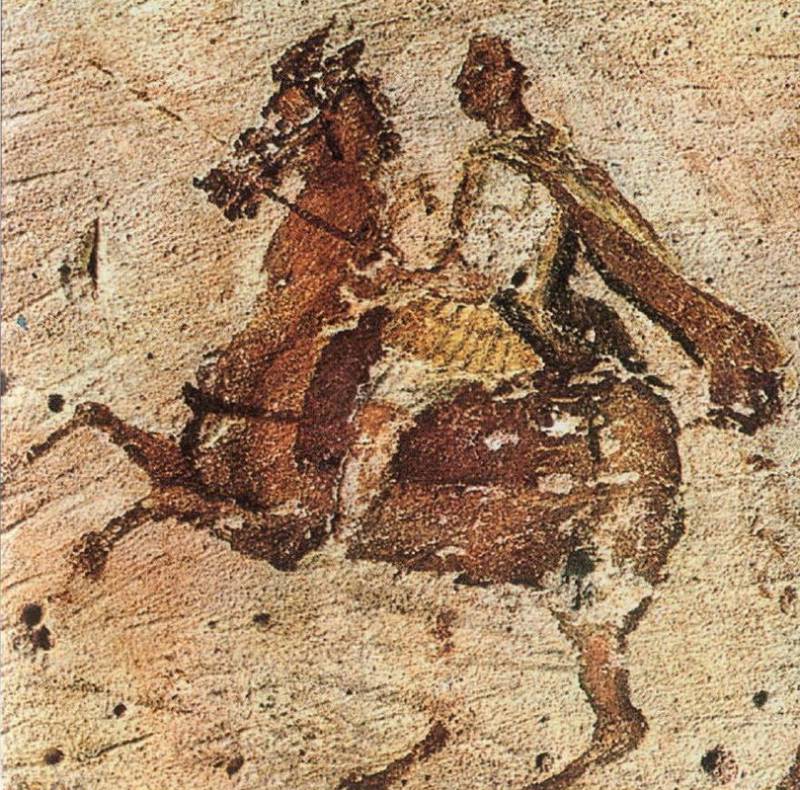
In 220 BC. e. Achaeus, in euphoria from the successes achieved and taking advantage of Antiochus' stay in the eastern satrapies, where he suppressed rebellions, declared himself the ruler of Asia Minor. There is an assumption that the promised support from Egypt also inspired the satrap to betray. Thus, according to Polybius, Hermias provided Antiochus with a personal letter to the Egyptian king as proof of this connection.
The question of the authenticity of this document is still controversial. Polybius in his notes has no doubt that the letter was a forgery, and Achaeus himself is only a rebellious aristocrat, and not Philopator's puppet at all.
On the other hand, there were plenty of prerequisites for the creation of such an alliance. It is unlikely that Achaeus would have dared to challenge a much more powerful nephew without having the proper resources and allies for this.
Be that as it may, the rebellious satrap would cause problems for Antioch for the next six years.
From Ptolemais to Porphyrion
Despite the difficulties associated with the rebellion of Achaea, Antiochus was eager to take revenge from the Egyptians for the unsuccessful campaign of 221 BC. e. Following the advice of one of his associates named Apollophanes, in 219 BC. e. the Syrian king decided to start a new campaign with the return of Seleucia to Pieria, the military and commercial port of Antioch, which was ceded to the Ptolemies following the results of the III Syrian War. The organization of a bridgehead in Coele-Syria for the subsequent attack on Alexandria was entrusted to Theodotus.
The capture of the city was not easy for the Seleucid monarch. The commander of the garrison, Lentius, agreed to lay down weapon only after the betrayal and desertion of most of their commanders. According to Polybius, after the capture of Seleucia, Antiochus planned to turn his forces against Achaea, and only after his elimination return to the war with Philopator.
Theodotus' letter took him by surprise, but the Syrian king considered it unreasonable to refuse such a tempting opportunity to take possession of the lion's share of Coele-Syria almost bloodlessly and went to the aid of the Aetolian.
Nicholas, who locked Theodotus within the walls of Ptolemais, did not have enough resources to withstand the approaching Seleucid troops, which forced him to retreat. Together with the Calydonian, Antiochus was also joined by his colleague Panetol, who at that time led the defense of Tire.
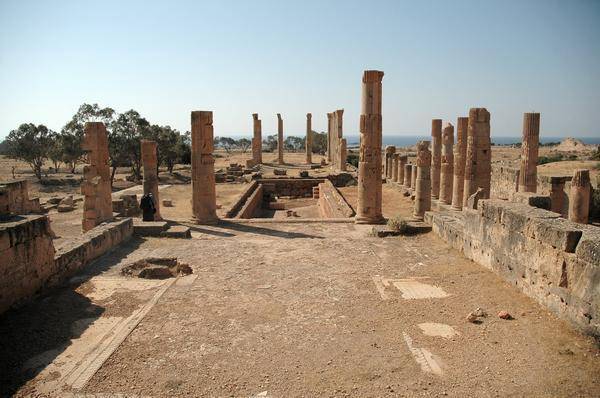
Ruins of ancient Ptolemais
The loss of two large cities at once, coupled with the defection of experienced commanders to the side of the enemy, put the Alexandrian court in a difficult position. Egypt was completely unprepared for a new war: confusion and vacillation reigned in the army, the training and competence of the officers, to put it mildly, left much to be desired.
The danger of the situation forced the king and his entourage to show ingenuity and enterprise. Unable to oppose Antiochus on the battlefield, Ptolemy, prompted by Sosibius, entered into peace negotiations and feigned a willingness to make concessions. In fact, the cunning Alexandrian did not even think about any peace and concessions, trying simply to gain time and create the illusion of Alexandria's helplessness and readiness to fulfill any conditions in the Syrian ruler.
In parallel with the diplomatic chatter in the Ptolemaic kingdom, a massive military reform was implemented step by step. As planned by Sosibius, the army began to be replenished with native Egyptians (mashimoi), who, together with the Greek-Macedonian cleruchs (military settlers), were to form the shock core of the phalanx. The idea worked: Antiochus decided not to invade Egypt, confining himself to capturing part of Coele-Syria, after which he left for the winter in Seleucia.
The fighting resumed in the spring of 218 BC. e. Not having achieved anything significant from Sosibius during the negotiations, Antiochus resumed offensive operations.
The storming of the pass under Porphyrion deserves the greatest attention here, the success of which was largely the merit of Theodotus.
Failing to break through the Egyptian fortifications in the Marsya Valley (modern-day Beqaa Valley in Lebanon), Antioch chose the more difficult coastal route. According to the Israeli historian Bezabel Bar Kochba, the positions of the Ptolemaic army were located near Porfirion, somewhere in the triangle between the settlements of Khan Nebi Younes, Barja and Jiye (about 25 km south of modern Beirut), and the battle itself took place nearby, in a narrow passage resembling the neck of a bottle.
Polybius writes that Nicholas, still in command of the Ptolemaic army in Coele-Syria, deployed defenses both in the passage itself and at three key points that allowed him to control the passage through the pass. Archers and slingers were stationed on the northern slope of the ridge crossing the pass, while light infantry was stationed on the western slope, ready to descend to the pass in the event of an enemy breakthrough. The third fortified point, “on the slopes of Mount Lebanon”, made it possible to observe all mountain paths and prevent bypassing the main defensive line.
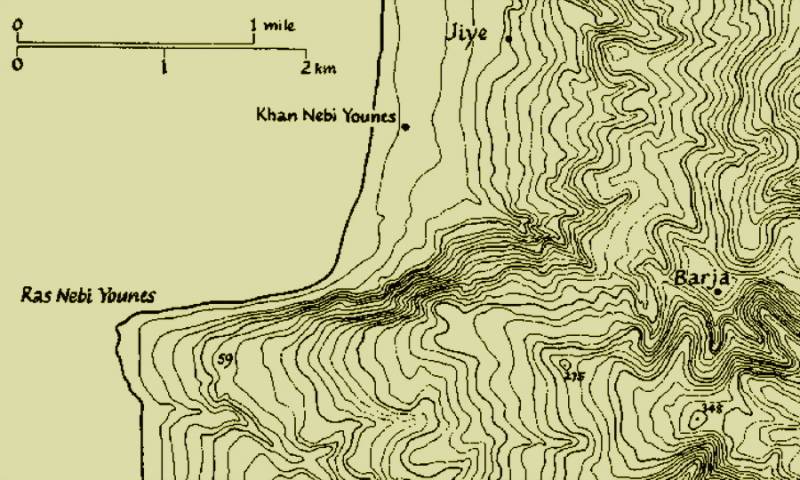
The battlefield at Porfirion. On the slopes of Hill 59 were placed the first and second fortified points of the Egyptians, occupied by skirmishers and light infantry. The last stronghold, which served to prevent detour maneuvers, was at heights 275 and 348
Preparing to attack the enemy positions, Antiochus divided his forces into three parts, one of which was placed at the disposal of Theodotus, setting him the task of capturing the height dominating the pass. Two other corps under the command of Menedam and Diod, carrying out attacks on Mount Lebanon from the east and trying to break through the pass, were rather engaged in diverting the attention of the defenders from Theodotus' breakthrough. In parallel, both sides met in a naval battle near the coast.
In the battle that ensued on the pass, Nicholas managed to hold back the pressure of Menedam and Diod in the passage and on the ridge, but he failed to prevent Theodotus’ detachment: the Calydonian soldiers made their way to the top of Lebanon, after which, turning in the direction of the passage from its inner side, they fell on the enemy’s fortifications. The defense of the pass fell, and Theodotus deserved the title of the main creator of this victory.
The defeated Nicholas lost about 2 people and was forced to retreat to Sidon.
Inconstancy of Fortune
Another notable military event with the participation of the Greek commander was the siege of Rabbat Amman (modern Amman), an important stronghold of the Ptolemaic troops in Arabia. The city was well fortified, its capture required a considerable amount of time and effort.
Here Theodotus was given the role of leader of the siege work on one of the sections of the fortress wall, chosen by Antiochus for the subsequent assault. The Aetolian acted in conjunction with Nikarchus, another commander of the Seleucid army. Both commanders arranged a kind of competition among themselves to destroy the wall. Ultimately, it collapsed, but it was possible to take the city only after the besieged were cut off from the water source.
However, success did not always accompany our hero - however, as well as his new patron. In the spring of 217 BC. e. Antiochus, not getting anything useful out of the negotiations with Sosibius, lost patience and launched a new offensive in Coele-Syria. However, this time Philopator was ready, the trick of his adviser worked: having lulled the vigilance of the Syrian king, the Alexandrian court managed to prepare a large and combat-ready army for the upcoming battle, whose core consisted of the native Egyptians as well.
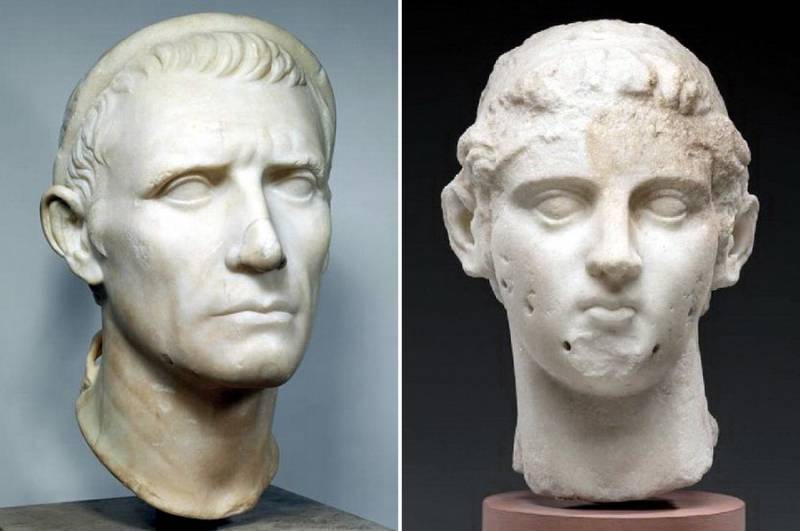
Marble busts of the kings participating in the IV Syrian War - Antiochus III the Great (Louvre, Paris) and Ptolemy IV Philopator (Museum of Fine Arts, Boston)
The battle of Raphia, in which the armies of both monarchs clashed, became one of the greatest confrontations of the ancient world.
In the initial phase of the battle, the parties carried out an "exchange of flanks". Antiochus, who traditionally stood on the right, managed to win the "battle of the elephants", overturning the forces of Ptolemy opposite, and putting the king to flight. At the same time, the weak left flank of the Seleucid army could not withstand the blow of the Greek and Galato-Thracian mercenaries, reinforced by cavalry under the leadership of the Thessalian Echecrates.
The battle culminated in a battle of phalanxes in the center, where 30 Seleucid Sarissophorians opposed 000 combined Greco-Macedonian and Egyptian phalangites. Theodotus led the Argyraspides, the "Silver Shields", an elite guard corps of 45 veterans. The command of another 000 heavily armed infantrymen was carried out by Nikarchus, already familiar to us from the events in Rabbat-Amman.
Soon Ptolemy returned to the battlefield, having managed to elude the pursuit of Antiochus and personally gave the signal for the start of the heavy infantry offensive. Despite the courage and steadfastness of the "silver shields", the outcome of the battle was determined by the superiority of the Ptolemaic phalanx in manpower. Nikarchus, seeing the defeat of the eastern units on the left flank, retreated, fearing to be surrounded. After this, the numerical advantage of the enemy became critical, Theodotus was forced to admit defeat and ordered the retreat to be trumpeted.
Returning after an unsuccessful pursuit, Antiochus could no longer change anything. The Seleucid army suffered not a crushing, but a tangible defeat, which, paradoxically, did not have serious consequences for either side.
Ptolemy happily agreed to the peace offered by Antiochus, having managed to return almost all the previously lost territories in Syria - with the exception of the city of Seleucia Pieria, which the Syrians retook at the very beginning of the war. Well, the Seleucid sovereign, having finished sorting out relations with Alexandria, went to Asia Minor to deal with Achaeus, who was annoying him.
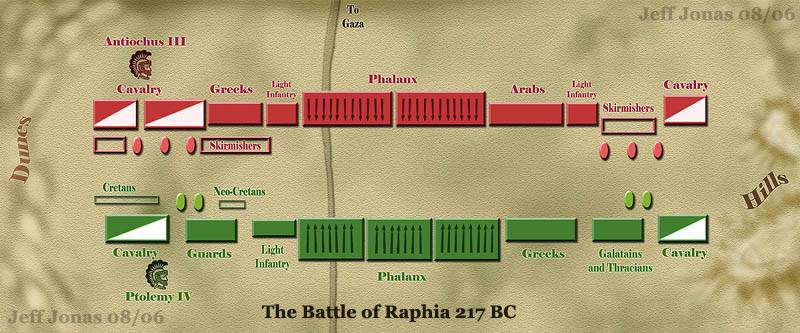
The dispositions of the Egyptian and Syrian armies before the battle of Rafiah. Theodotus and his argyraspids stood in the center right, directly opposite them was a phalanx of 25 Ptolemy's Greek-Macedonian cleruchs
Another notable episode involving Theodotus took place right on the eve of the battle of Raphia. An Aetolian with two associates made his way to Ptolemy's camp and attempted to assassinate the king. However, Philopator himself was not in the tent, and instead, according to Polybius, the royal doctor was killed, and two more people were injured.
It is possible that in this case, and during the personal persecution, Antiochus made a bet on the physical elimination of the Egyptian ruler. Such a move would almost certainly win the battle, and at the same time sow chaos in the Ptolemaic dominions and impose favorable peace terms. But in the end, the Seleucid side had to ask for peace.
Polybius appreciated this act of Theodotus in his own way, calling it "a deed worthy of an Aetolian." With this paradoxically ambiguous phrase from the point of view of perception, he simultaneously recognized the courage and courage of the Calydonian, and at the same time emphasized once again the robber nature of the natives of Aetolia (which, in principle, you can’t argue with).
On the walls of Sardis
Sardis, the great ancient city, the capital of the once mighty Lydian kingdom, became the last point of Theodotos's military path in the texts of Polybius. Having reconciled with Ptolemy for a while, Antiochus was finally able to focus on the fight against Achaea, personally leading in 216 BC. e. campaign against the self-proclaimed "King of Asia Minor".
Achaeus and his companions took refuge behind the walls of Sardis, not having enough strength to fight the Seleucid army in open battle.
Even after a year of siege, the morale of the defenders was still high: Achaeus expected the imminent arrival of Aetolian mercenaries, recruited with money provided by Alexandria and sent to Anatolia through Ephesus. The second person in charge of the defense of the city was the Persian chief Aribaz.
Despite the reliability of the city walls, there was a man in the camp of Antiochus who figured out how to get inside. They became the Cretan Lahorus, who, like Theodotus, had previously served Philopator and deserted to Antiochus shortly before the battle of Raphia. His idea involved the consistent interaction of three selected detachments at once.
The first detachment, numbering only 15 people, was supposed to climb an almost impregnable, but at the same time poorly guarded cliff, nicknamed the "Saw", get behind the wall to the gate and try to open it from the inside using special mechanisms.
The second detachment, numbering 30 soldiers, was instructed to open the gate from the outside, acting synchronously with the first detachment. The last unit was the most numerous - 2 people who had to break through the open gates and hold them until the arrival of the main body. Theodot, along with Lagor, were among the daredevils who were expected to climb the "Pila" and break through to the gate from the inside.
The soldiers of the Syrian army had the opportunity to observe the pioneers, while the ledge of the cliff hid them from the defenders of Sardis:
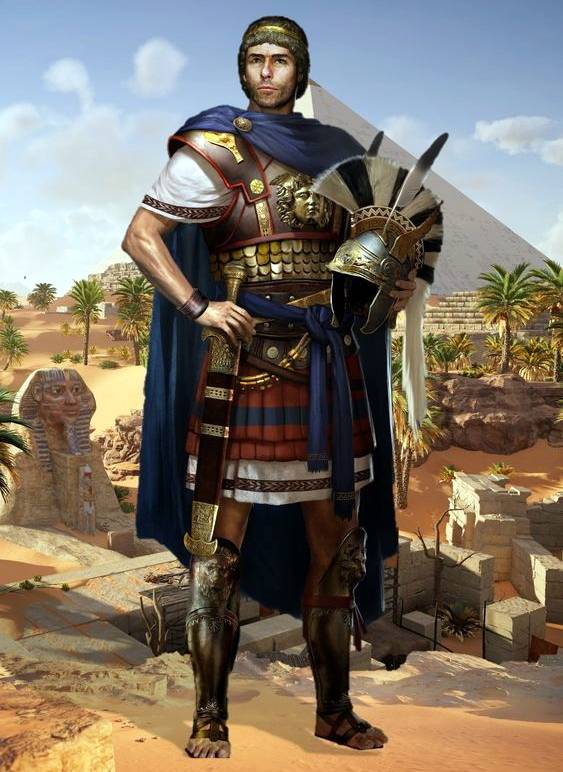
Artist's reconstruction of a Greco-Macedonian officer in the service of the Ptolemies. Possible appearance of Theodotus of Calydon
Most of the garrison was thrown by Aribaz to the Persian gates, which Antiochus began to falsely assault in order to divert the attention of the besieged from the sabotage that was being prepared at the opposite end of the wall. This allowed the saboteurs to freely penetrate the walls and proceed to open the gates. Achaeus, apparently, still felt something was wrong and sent part of the troops to the alleged place of penetration. However, time was lost, and the defenders did not have time to prevent the opening of the gates and the breakthrough of large enemy forces behind the walls. The surviving besieged, including Achaeus, took refuge in the acropolis. Later, the rebellious satrap was lured out of the fortress by deceit, captured and sentenced to death.
In the city square of Sardis, the story of Theodotus from Calydon ends.
His further actions are shrouded in fog; Polybius does not have any mention of a military leader in the description of Antiochus' further military campaigns. It is only known for sure that he did not meet the end at home: according to available data, of the Aetolian mercenaries who took part in the struggle for Celesiria, only Theodotos' comrade-in-arms Panetol returned home, joining with him the Seleucid king.
It is curious that the military epic of Panetol did not end there: in 167 BC. e., already a deep old man, he was appointed to the post of strategist of the dying Aetolian Union, whose imminent dissolution by the Romans became a gloomy omen of future troubles for the freedom-loving Hellenes.
At the same time, at home, apparently, they had heard a lot about the overseas exploits of Theodotus. At least, it is with his name that historians associate the inscription on the basis of a statue found in Delphi in 1895:
The fate of the Aetolian himself is hidden by the veil of time and remains a mystery that hardly anyone will ever solve.
It is not so important whether he fell in battle, died of illness, or simply retired and lived out his life away from the battlefields. Personalities like Theodotus attract modern historians because not so much is known about their lives and accomplishments.
At the same time, it is they who often become the key to the success of larger and more significant figures, thereby complementing, and sometimes embellishing in our eyes, the images of military leaders, scientists, statesmen and religious figures.
Sources and literature:
A. A. Abakumov. Battle of Raphia: main historiographical problems // Studia historica. XIII - M., 2014
A. A. Abakumov. "A Deed Worthy of an Aetolian": The Syrian War of Theodotus of Calydon // Antique World and Archeology: Interuniversity Collection of Scientific Papers. Issue. 17 - Saratov, 2015
I. N. Avramenko. The capture of Sardis by the troops of Antiochus III in the coverage of Polybius // Antique World and Archeology: Interuniversity Collection of Scientific Papers. Issue. 11 - Saratov, 2002
Polybius. General history - M .: "Academic project", 2020
Bezalel Bar-Kochva. The Seleucid Army: Organization and Tactics in the Great Campaigns – Cambridge University Press, 2012
John Grainger. The Syrian Wars-Brill, 2010
Information